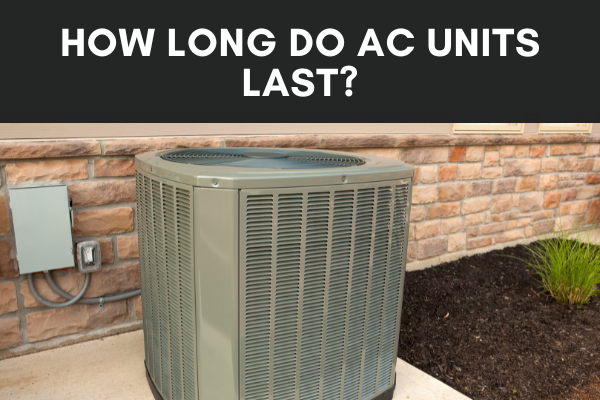Your AC unit could mean the difference between enjoying your home or roasting in it, making it a vital part of any home in a warmer climate.
Your AC unit’s lifespan is determined by how often you use it, the local weather, its maintenance, and the type of HVAC system it is. Generally speaking, newer heating, ventilation, and air conditioning (HVAC) units can last between 15-20 years, while older units may only last from 10-12 years. Window AC units will have a shorter lifespan of around 8-10 years.
The Lifespan of Different HVAC Units
Nowadays, there are different HVAC and cooling systems you can choose from. Each has a distinct price tag and life expectancy.
- Split system: In this article, when we refer to an HVAC unit, we are talking about a standard split system. This is the most common HVAC unit used in the U.S., and it lasts between 15-20 years with adequate care.
- Window AC unit: This is the AC unit you see placed in the window of a home. It is typically used to cool down just one room. These last between 8-10 years.
- Ductless system: This type of system is great for buildings that don’t have ductwork. They are energy efficient but not great for cold climates. These systems last about 20 years.
- Geothermal system: As the most expensive HVAC system, this offers quadruple the energy efficiency of other HVAC units. The outdoor parts of this system last roughly 50 years and the internal parts for 25.
- Packaged system: This system is in one cabinet and can use gas/electric, a heat pump, or a hybrid. They tend to last around 15 years or less.
- Hybrid system: This system lets you choose between a heat pump or a gas furnace. They are slightly more expensive but reduce monthly energy spending. These also last around 15 years.
Factors Affecting HVAC Lifespans
Two families may have the same home and HVAC system, yet one system could last twice as long as its twin. This happens because your use, climate, maintenance, and HVAC system type will determine how long your AC unit truly lasts.
Personal Use
If your AC is blasting 24/7, the unit will likely give out much earlier than one that’s only used a few hours a day. Normal wear and tear happens on HVAC units the same as on any other appliance, so your rate of use will affect how much your system wears down.
Other personal factors that affect your system include your thermostat setting and the air quality of your home.
Climate
Your local climate and outside air will affect the external portion of your AC unit. For example, those living in coastal areas with salty air may see their condensing coil break down much faster than others.
Hotter climates will also cause the unit to consume more energy, increasing the risk of a malfunction.
Maintenance
HVAC units should be inspected and have routine maintenance performed regularly. This includes having an HVAC tech come in for a tune-up, replacing the air filters, and clearing off leaves, debris, and snow from the outside unit.
The more regularly the unit is maintained, the easier any issues are resolved, and the longer the unit can function.
Type of AC Unit
As mentioned above, different HVAC systems have different lifespans. Find out which system your home has, determine how long it’s been installed, and find out how many estimated years of life it has left.
To read this article in Spanish, click here.

